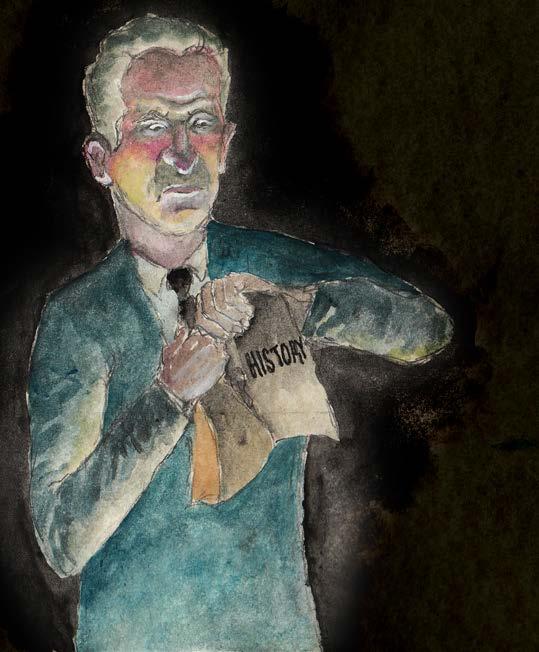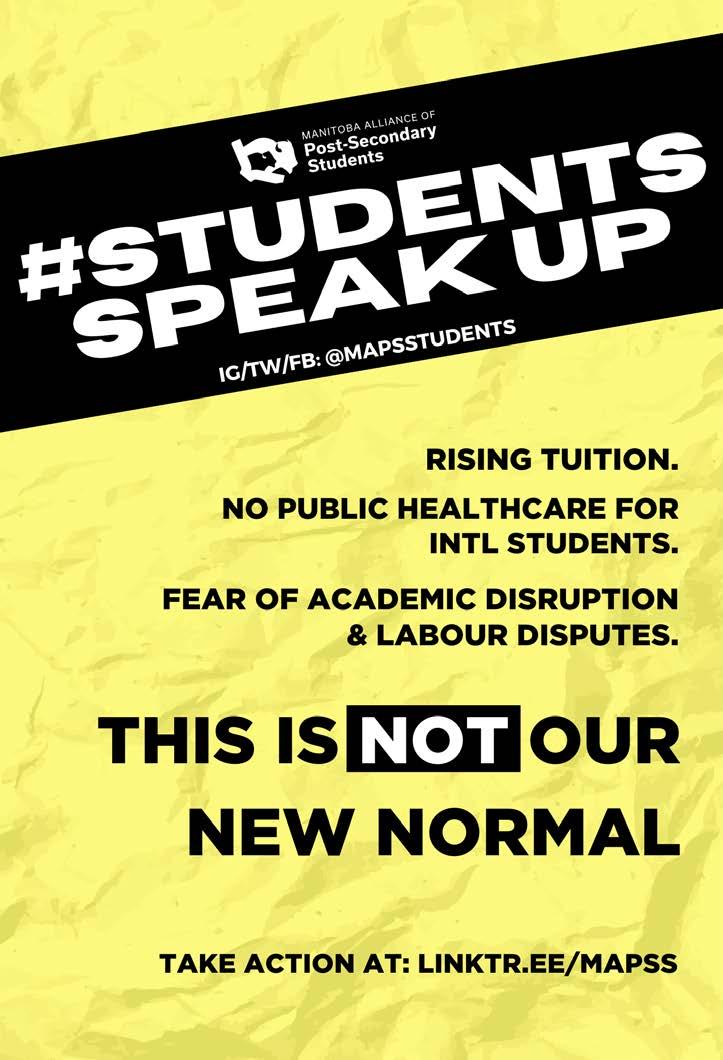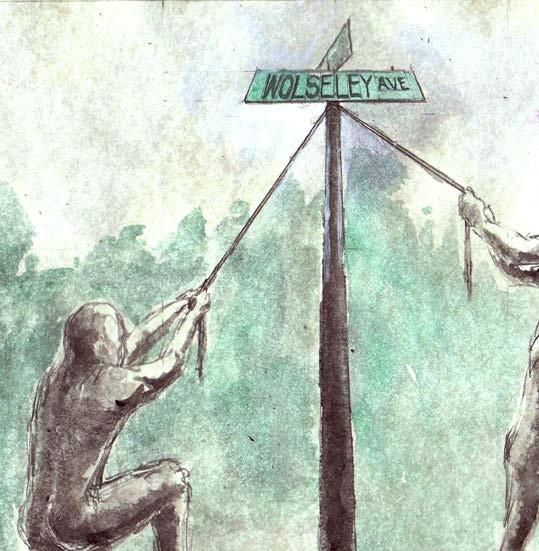
8 minute read
Editorial
Pallister’s racism is becoming increasingly apparent
The famed poet T. S. Eliot once remarked that April is the cruelest month, but the recent spate of comments on residential schools and Canadian history by the Progressive Conservative Party of Manitoba puts forward a compelling argument that it should be July instead. On July 7, Premier Brian Pallister opened a press conference with mention of the toppling of two statues on legislative grounds during a July 1 march in memory of residential school victims. Over 1,000 graves had been discovered on or near residential school sites around the country, sparking widespread mourning and a national push to cancel Canada Day celebrations. During the press conference, Pallister made a series of appalling statements, most notably that “The people who came here to this country, before it was a country and since, didn’t come here to destroy anything, they came here to build.” A week later, he doubled down, saying he stood by his comments and told Manitobans to reread his comments with “an objective heart and mind” despite the resignation of Eileen Clarke — the provincial Indigenous and northern relations minister — a few days earlier. Clarke later released a statement saying her decision was due, in part, to her voice not being heard in cabinet. While the release never explicitly mentioned Pallister or his comments, it made reference to constituents across the province upset with a perceived lack of representation and noted that “Inappropriate words and actions can be very damaging.” Clarke’s replacement, Alan Lagimodiere, caused another uproar — just minutes after being sworn in on July 15 — when he said residential schools were intended to teach Indigenous children skills to fit into society. He also articulated that he believed administrators “thought they were doing the right thing.” Unlike Pallister, Lagimodiere apologized for his comments via Twitter a few hours later and a press release the next day. That did not stop the official Manitoba PC caucus Twitter account from releasing a tweet condemning Wab Kinew, who interrupted Lagimodiere’s press conference to hold him accountable for his statements. “We are all committed to meaningful progress on reconciliation,” the now-deleted tweet read. “The political showmanship of storming into someone else’s press conference to bully a minister who was sworn in only 10 minutes earlier does nothing to advance that reconciliation.” One might call the situation a comedy of errors if it were even remotely amusing. Pallister and Lagimodiere’s comments reflect a delusional view of Canadian history — one which upholds white supremacy and genocide as unintentional. The most cursory glance through any reputable history textbook — with which Pallister should be familiar, given how often he talks about his past as a teacher — is enough to demonstrate
Distasteful comments during press conference warrants resignation EDITORIAL that European settlers moved to what is now Canada with the express purpose of expanding white imperial control. Hundreds of thousands of historical government documents depict a blatantly racist attitude toward Indigenous nations and discuss plans for total assimilation into the dominant white Anglo-Saxon Protestant society. The last residential school closed in 1996, only 25 years ago, and the Truth and Reconciliation Commission of Canada and the National Centre for Truth and Reconciliation have spent over a decade collecting evidence and testimony of the horrors perpetrated by residential schools. This is not new knowledge. There is no excuse for continuing to pretend other narratives are accurate. At best, the PCs, under Pallister, have shown themselves to be jaw-droppingly ignorant and at least 50 years out of date. At worst, they appear deliberately malicious toward the community they claim to serve. Even if Pallister and Lagimodiere’s comments could be taken in good faith, which they should not be, the broader context of the quotes makes the situation even more unforgivable. Of all the times to publicly repeat racist, genocidal misinformation about residential schools and Indigenous history, it is mind boggling that Pallister and Lagimodiere saw fit to do so in response to nationwide protests and memorials for deceased children. In Manitoba alone, 104 potential graves have been identified near the grounds of the former residential school in Brandon. How can any Indigenous communities in Manitoba trust the PCs after receiving this kind of response? Though Pallister has repeatedly defended his efforts toward reconciliation — all the while doubling down on his statements — his and his minister’s behaviour reflects a party that can’t even be trusted to pay lip service to Manitoba’s Indigenous populations without adding insult to already grievous injury. With voters waiting patiently for the next election set for 2023, one can only hope that at some point the PCs will develop a moral compass and force Pallister to resign. Until then, efforts toward reconciliation in Manitoba will be pointless with him at the helm.
graphic / Dallin Chicoine /
staff
words / Sarah Doran /
staff

The quiet history of Manitoba’s colonial namesakes
Wolseley an infamous colonial cog internationally, neighbourhood must be renamed
COMMENT
Lucas Edmond, staff Following the toppling of two statues commemorating Queen Victoria and Queen Elizabeth II at the Manitoba Legislature on July 1, Métis activist group Red River Echoes drew attention to the fact that one of Winnipeg’s central neighbourhoods commemorates a dark period in Métis history and colonial dispossession writ large.
Wolseley — occupying the space sandwiched between Portage Avenue, the Assiniboine River and Maryland Street — is named after Col. Garnet Wolseley, who is known locally for his leadership of the Red River Expedition. The expedition was sent to supposedly tide over Manitoba’s transition to confederacy following the Red River rebellion. However, many Métis communities remember this expedition as the “Reign of Terror” — a name meant to draw parallels to the bloody tyranny of upper-class governance during the French Revolution just a century earlier.
Pamphlets about Col. Wolseley’s legacy in Manitoba were distributed throughout the neighbourhood last month. One line read, “He personally incited racism, violence, murder and displacement when his troops arrived here.” What is usually read in gradeschool history books as a patriotic expedition was truly a militia made up of hundreds of Anglo-Protestant settlers bent on avenging the execution of Thomas Scott — a radical Orangeman who opposed Métis sovereignty and Louis Riel’s leadership.
Further, Col. Wolseley was a crucial player in watering down Indigenous influence and promoting then-prime minister John A. Macdonald’s project of colonial expansion westward via the settlement of Anglo-Canadians.
Not only were Métis populations in Manitoba terrorized and brought under military occupation during this period, but the militia’s presence stimulated settlement. By the summer of 1870, it wasn’t just water funnelling into one of Canada’s largest flood plains. Just decades after Col. Wolseley established Canadian troops on Métis soil, white settlers began composing a majority population and diluting the Métis population’s social and political influence over their home region.
For Métis populations that didn’t leave during the Reign of Terror, rape, lynching and dispossession — motivated by ethnic and religious divides — defined their introduction into confederacy.
Although a shameful face of Manitoba’s introduction to Canada, Col. Wolseley’s name also rings a sour bell for several Indigenous populations around the world. From Egypt to India, Crimea to Burma and China to South Africa, Col. Wolseley participated in and led military campaigns designed to eradicate threats to Britain’s imperial interests.
Having his name plastered on the streets of Winnipeg is not only an insult to Métis popu lations locally, but to dispossessed populations globally. Indeed, he was a central cog in the violence that permeated through colonial thinking and structures.
Col. Wolseley’s international reputation runs deep and his imperial influence as a key figure in the British military has played such a significant role that many of his historic interventions continue to influence the contemporary state of geopolitics. His time spent in the military has linked global processes around the world with British economic exploitation — likely one of the most radical being the suppression of the Egyptian ‘Urabi Rebellion in the 1880s.
Following the American Civil War, cotton exports from the United States dropped significantly and created a massive demand for a new primary cotton source in British mills. Within Britain’s colonial metropoles, over 500,000 individuals became unemployed, redefining the 1860s as a “cotton drought.” In this same period, British capital investments flooded Egypt to stimulate cotton production, increasing Egyptian exports five-fold. Nearly 40 per cent of all arable land in lower Egypt was converted to sustain the new and heavy demand for cotton. Although the drought stimulated investment in Egyptian infrastructure and cotton exports, it also established a volatile plantation economy linking each Egyptian peasant directly to the dictates of western politicians, venture capitalists and bankers far away.
Following the reintroduction of the U.S. into the global economy, the price of cotton plummeted and forced producers to default on loans taken out with heavy interest rates from western bankers. The ultimate effect was the liquidation of Egyptian assets into western hands. This period in history is famed for the financial seizure of the Suez Canal — currently one of the largest and most profitable shipping routes in the world — to stave off national bankruptcy. The massive land dispossession witnessed in this period culminated in mass resentment of British financial imperialism and motivated a peasant uprising known as the ‘Urabi Rebellion.
Fearing the loss of control over the financial system in Egypt, the British invaded. It was Col. Wolseley that led the campaign against the ‘Urabi Rebellion and defeated the national uprising on Sept. 13, 1882, seizing control of the Suez Canal and subsequently all of Egypt. Col. Wolseley’s influence would establish a 74-year colonial occupation of Egypt.
Just like the colonial occupation of Egypt, Col. Wolseley stole and desecrated Indigenous land in Manitoba, too.
If Canada is to reconcile these injustices, colonial namesakes must be removed and Indigenous roots restored.
Whether it was settler colonialism in Manitoba or financial colonialism and imperialism in Egypt, Col. Wolseley was a force that proliferated unimaginable suffering and dispossession globally. His name has no place in Winnipeg’s streets.
comment@themanitoban.com







